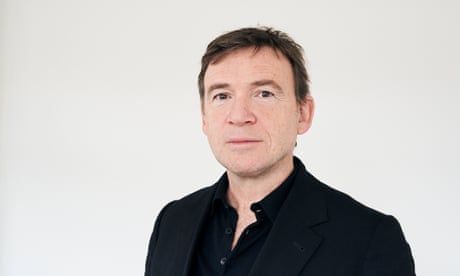
The bestselling author on why he finds it easier to be funny on the page, being inspired by Sue Townsend and Victoria Wood, and his struggle with the ending of You Are Here
David Nicholls, 57, is a screenwriter and author whose six novels include Us, longlisted for the Booker prize in 2014, and the multimillion bestseller One Day (2009). His latest novel, You Are Here, is currently on the shortlist of the Bollinger Everyman Wodehouse prize for comic fiction, the winner of which is announced on 2 December. The story of a divorced copy editor who meets a depressed geography teacher while on a hike across the north of England, it’s been praised by the New York Times as “an affectingly hard-won romance… sharp-tongued and irresistible, the most intelligent treat”.
How did this book come together?
I was going to write a big London novel, then lockdown happened and suddenly I didn’t know what a London novel would look like. Everyone was at home, anxious and distracted. I guess that planted the seed. I was aware of how much I missed the countryside, even though I’m a Londoner who’s never really lived in the countryside. I was aware how difficult it was for friends living alone, and I was aware how difficult communication was becoming. After lockdown, I found myself tongue-tied and awkward. So those were the strands: I wanted to dig into my craving for the countryside, I wanted to write about the benefits and demands of conversation, and I wanted to write about loneliness.
Not to mention the enduring psychological impact of random street violence…
That, again, seemed a tough subject to include in what is essentially a romantic comedy. I love London and I fight against its portrayal as somehow a place of no-go zones and constant threat – it really isn’t that. At the same time I’m aware of how a moment on the tube – a look, a remark – can flare up into something that can change the course of a life. It’s something I feel all the time in the city.
Let’s make clear you’re up for a comic fiction award here.
I know [laughs]. I’ve tried to write six comic novels now and this is the first time I’ve been nominated. There’s no contradiction between writing a comedy and writing something that’s about melancholy or depression or alcoholism. I guess this is just the first one where I’ve really tried very precisely on a line by line basis to make it funny.
What’s involved in that?
Chiselling away at the sentences and dialogue until they take it off me. I’d always love to do another draft post-publication. I don’t open the document that will be the novel until quite late; for a year I just scribble jokes and observations and character sketches and ideas for scenes in a big sketchbook. The first draft is always straining too much to be funny, a bit like someone trying too hard at a party.